
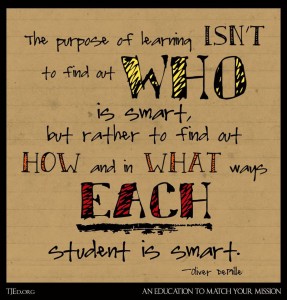 Since TJEd places such high value on parents leading out and personalizing in their homes, the answer to this question can vary quite a bit; and there are some principles that are constant.
Since TJEd places such high value on parents leading out and personalizing in their homes, the answer to this question can vary quite a bit; and there are some principles that are constant.
Here is the TJEd philosophy in a nutshell:
Every student has inner genius, and the best educational results are usually attained when a mentor continually assesses what the individual student needs and tries to help deliver it.
That’s it. The rest is just possible ways to do this.
Standing on their Shoulders
Think of the best teacher you ever had… What made him or her so great?
- Did he truly care about you?
- Did she give you a vision of who you could become?
- Did he love the topic so much that it was inspiring?
- Did she challenge you to be more?
- What other things made your best teacher so good?
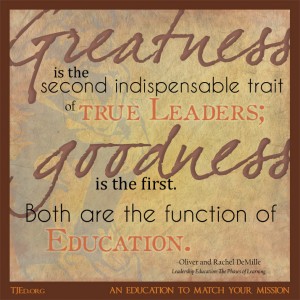 Whatever your answer, all of these are part of the Leadership Education philosophy. It all boils down to a mentor taking stock of what each student really needs most, and then helping him get it.
Whatever your answer, all of these are part of the Leadership Education philosophy. It all boils down to a mentor taking stock of what each student really needs most, and then helping him get it.
This means different things for different students, so TJEd is always individualized. It also means different things for the same student at different times, because any student will need different things at age 7 than at age 16, for example.
The central points of TJEd can be summed up as follows. You might want to stop and think about each of these as you read:
- Every student has areas of inner genius and/or potential greatness.
- The purpose of education is to help the student find and develop such areas of inner genius, along with obtaining general knowledge and skills that will be helpful in the student’s life and help the student really flourish personally and improve society through dedicated service.
- Students typically find their areas of genius by pursuing studies they are passionate about.
- Great mentors can help students get passionate about new areas.

- The focus of great mentors (parents, teachers, coaches, etc.) is learning, not educational systems or bureaucracy.
- Part of great education is identifying one’s life purpose or potential life missions and preparing for them through the learning process. Even when a student’s plans change, as they often do, the enthusiasm generated by pursuing learning for a life purpose usually translates into further passion for later missions.
- Mentors can help students expand their areas of passion outside their comfort zone, but the passion should be “pilot” and the other things should take a supportive role.
- Great education nearly always flows naturally from great teaching and mentoring.
- The simplest way for a mentor to start being a great mentor is to identify the greatest teachers, coaches and mentors from his or her own life experiences, clarify in his mind what made these teachers so great, and seek to emulate the best things about these great teachers—always with an eye toward the personalized needs of an individual student.
- The role of education mentors and teachers is to inspire students, by example and by whatever is personally inspirational to each individual.
- The responsibility of getting a great education is that of the student, not the mentors, parents or teachers. Mentors inspire, students study and learn.
- Parents are the only true experts on their homes and children; teachers are the only true experts on their classroom.
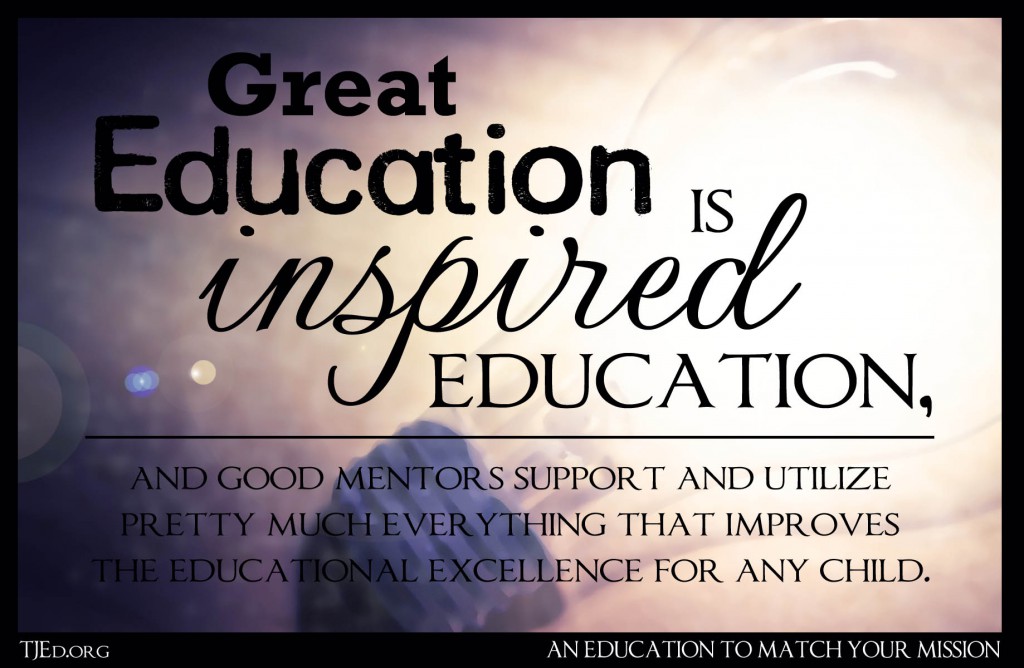 Perhaps the greatest support to this TJEd philosophy is the methodology, which is summarized by the 7 Keys of Great Teaching.
Perhaps the greatest support to this TJEd philosophy is the methodology, which is summarized by the 7 Keys of Great Teaching.
Again, the 7 Keys are not the philosophy, but they are a powerful methodology that mentors can use, modify, or not use, as needed to best help the individual student learn most effectively at a given time.
Want to learn more?
If TJEd is calling to you, I would not recommend “winging” it. Don’t just mimic a friend, or browse and guess. You’ll feel so much more confident and empowered when you do your homework. There are lots of freebies available on this site to help you get a “feel” for whether TJEd is a fit for you. Check out the links at the end of this post! 🙂
Once you’re past that point, and feel like it is a fit – the our Mentoring in the Classics + TJEd Implementation course is set up specifically to help you become a self-guided learner, design your ideal family education culture, become conversant in the language of the classics, and really *own* the principles of Leadership Education so you can be your own expert. Check it out!
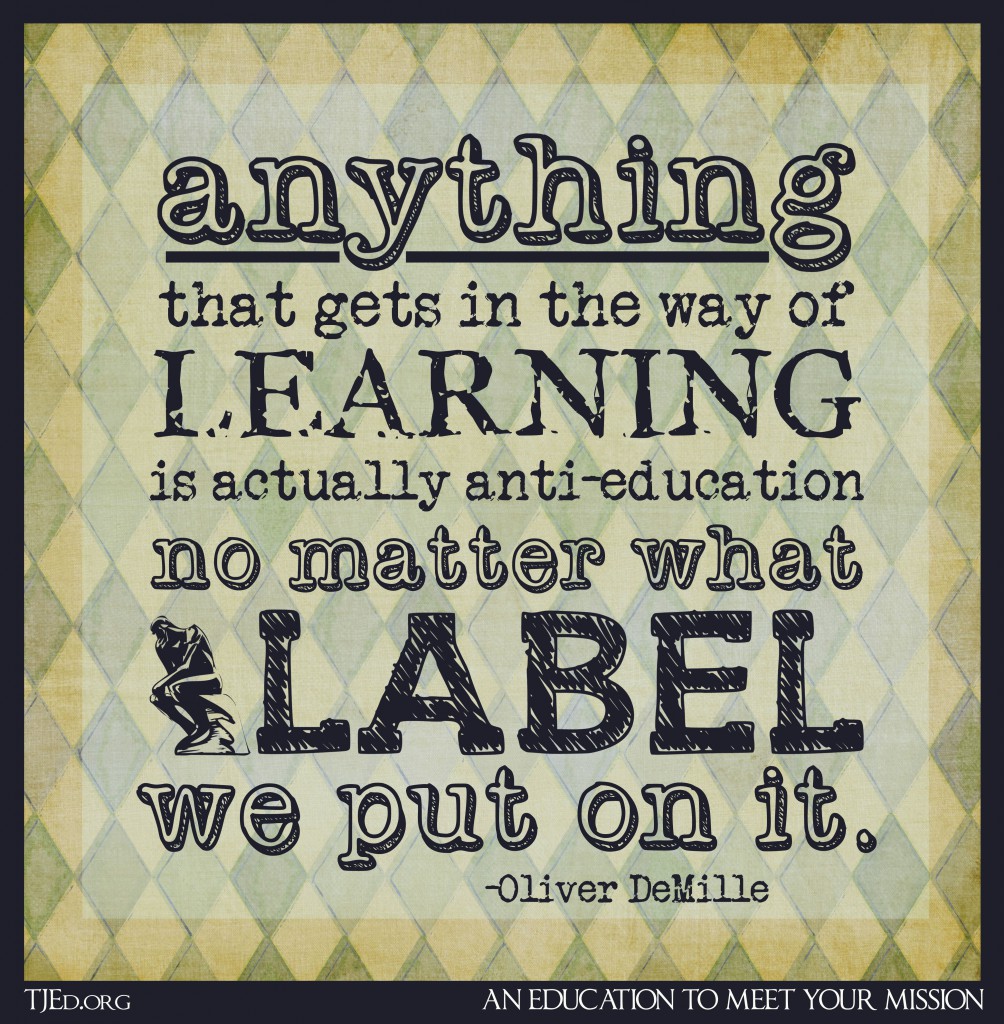 And please, do join the discussion about how to apply TJEd in your home and classroom. There are thousands of inspiring and supportive parents mentors on our Facebook group sharing daily in the dialog, with ideas on how to, which resources, when this-or-that, etc.
And please, do join the discussion about how to apply TJEd in your home and classroom. There are thousands of inspiring and supportive parents mentors on our Facebook group sharing daily in the dialog, with ideas on how to, which resources, when this-or-that, etc.
With Rachel DeMille as the moderator and dozens of ad-hoc mentors who go out of their way to be helpful, you’re sure to find answers to your questions!
Resources to Learn More:
- About TJEd
- The 7 Keys of Great Teaching
- The Phases of Learning
- Bonus Gifts/Newsletter
- How to Learn and Teach Math
- Math Resources
- Free Math Class for YOU! <3
- Recommended Classics
- Trainings
- Browse our store
- Why is Thomas Jefferson an Icon of Leadership Education?

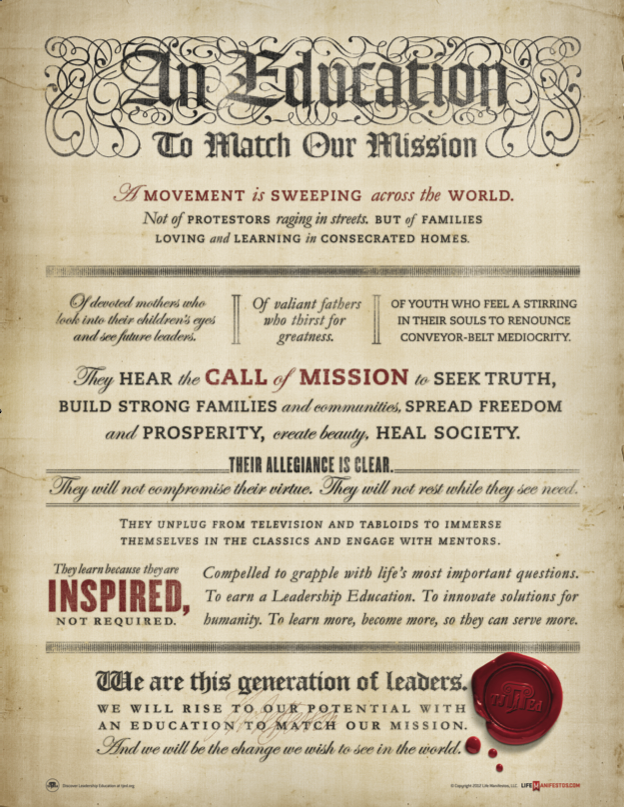




























Leave A Comment